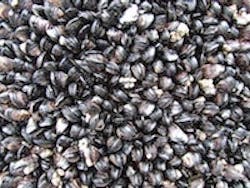U.S. Fish & Wildlife Service Releases Draft Assessment of Critical Habitat Designation for Freshwater Mussels
The U.S. Fish and Wildlife Service is releasing the estimated cost and economic impacts and draft environmental assessment of the proposed critical habitat designation of two freshwater mussels, and is seeking public comment. The two mussels, the Neosho mucket and the rabbitsfoot, are found in several Midwestern and southern states, including Missouri, Indiana, Illnois and Ohio.
Last year, the Service proposed to list the Neosho mucket as endangered, and the rabbitsfoot as threatened under the Endangered Species Act. The Service also proposed to designate critical habitat for these two mussels in 43 critical habitat units encompassing 2,138 river miles of stream channel in Alabama, Arkansas, Illinois, Indiana, Kansas, Kentucky, Mississippi, Missouri, Oklahoma, Ohio, Pennsylvania and Tennessee.
The Service has conducted a draft economic analysis of the proposed critical habitat designation, as required under the ESA. The analysis considered the potential impact of the designation on various sectors of the economy. Based on the best available information, including extensive discussions with stakeholders, the Service estimates that the designation may cost $4.4 million to $5.9 million over 20 years.
The majority of these costs are administrative and may be borne by federal and state agencies; however, some costs may be incurred by local governments and businesses. These costs stem from the requirement for federal agencies to consult with the Service regarding the impacts of their actions, or those that they fund or authorize, on critical habitat. Transportation and utility activities are likely to be subject to the greatest impacts at $1,400,000 over the next 20 years; followed by timber, agriculture, and grazing at $960,000; development at $760,000; other (animal and biological control, prescribed burns, land clearing, bank stabilization, habitat or shoreline restoration) at $530,000; oil and gas development at $320,000; water flow management at $190,000; water quality management at $120,000, and mining at $71,000. The Service anticipates the proposed designation will have minimal effects on 227 entities or small businesses annually.
The Service has completed a draft environmental assessment of the proposed critical habitat designation, as required under the National Environmental Policy Act. The draft environmental assessment found the preferred alternative of designating critical habitat for the Neosho mucket and rabbitsfoot at the 43 proposed locations would not have significant impacts to people or their activities.
The draft economic analysis and draft environmental assessment is available at www.regulations.gov, Docket # FWS–R4–ES–2013–0007, or on the Service's website at www.fws.gov/midwest/endangered.
Source: U.S. Fish & Wildlife Service
